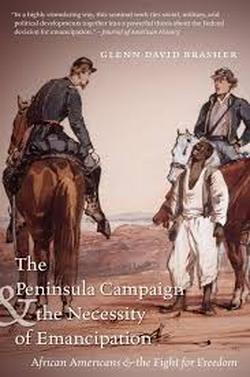
Glenn David Brasher
The University of North Carolina Press, 2014, 296 pp., $27.95
ISBN: 978-1-4696-1750-3
Image courtesy of amazon.com
There has been a recent interest into the summer and early fall of 1862 regarding the military and emancipation. Glenn David Brasher gives new insight into the involvement of African Americans and the Peninsula Campaign which aids Abraham Lincoln and his decision to issue the Emancipation Proclamation. While readers would assume that this work centers around the fighting of the Peninsula Campaign, most of the work analyzes the work which the African Americans provided for the cause and the great monuments to their work. Here in this work, Glenn David Brasher truly gives us something different and something to think about.
Glenn David Brasher is an instructor of history at the University of Alabama. He is a native of Birmingham, Alabama and has received his Ph.D. from the same university. For eight years he was a seasonal field guide at the Richmond National Battlefield and had his specialty in the Peninsula Campaign. He has also taught at the Virginia Commonwealth University and contributes regularly to the Civil War Monitor and the New York Times “Disunion.” In 2008, he was a finalist for the Southern Historical Associations C. Vann Woodward Award and is the 2013 recipient of the Wiley-Silver Award from the Center for Civil War Research at the University of Mississippi.
Upon the first look at this book, readers may feel as though it is an analysis on the Peninsula Campaign and while there are some things about the campaign in the work, the focus is quite different. The book is separated through the months ranging from April of 1861 all the way to July of 1862. Throughout the text, Brasher proves that there were efforts of the African American population which were overshadowed by the “Hero Making” of Union officers. The press often took notice more of the hero making than the works of the African Americans in the campaign. It is also in this work where there are quite a few pictures which show the relations between the Union soldier and the freed slave. In the realm of military intelligence, there were quite a few officers in the Union army which trusted the words of freed or escaped slaves over that of their own intelligence gatherers. It was at this point in the war when the Pinkerton agency began to falter with their intelligence and the words of the African Americans were more reliable than them. In my opinion, this was more important to the war effort than the constructing which they were doing to aid the army. While the participation of the African Americans were important, he also analyzes the morale of the Union soldiers during the Peninsula Campaign. In his chapter on July of 1862, he remarks the many times which not only the soldier morale was down, but the officer morale was low as well. This was an army which was supposed to bring Richmond to its knees and in the eyes of many of the officers was a decent plan. But as he states with resounding evidence, the morale was bad. Another interesting part in this study is the implementation of the abolitionists during the campaign and their reactions to the failures which had come about. Some, such as Henry Ward Beecher, were angry that emancipation had not yet come and blamed the campaigns failure on the nation’s refusal to liberate slaves.
This book is quite thought provoking in many areas in a good way. Due to the participation of African Americans during the Peninsula Campaign, there was a push for emancipation from abolition leaders, many of whom were in the political circle. In usual campaign analyses, there is just a military outlook, but here, we get all ends of the spectrum: military, social, political and abolition. I highly recommend this book to anyone with interest in the politics of the abolitionist movement during the Civil War and how they were morphed by the military actions of the eastern armies. Highly Recommended.
 RSS Feed
RSS Feed
